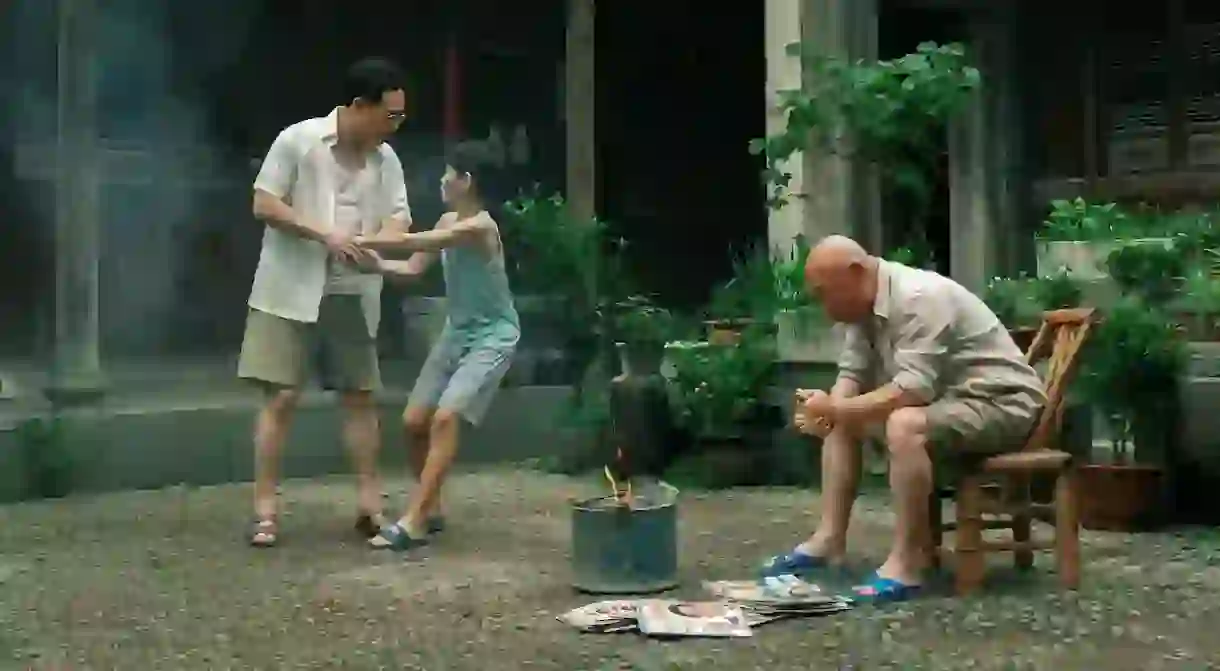'End of Summer' Channels Chinese Nostalgia for World Cup '98

Three males of different generations come of age in a deft family drama with a soccer backdrop.
World Cup fever may rise to a pitch every four years, but its residue can linger for decades. Director Zhou Quan, who would have been 10 years old when the 1998 World Cup was staged in France, channels nostalgia for that tournament in his debut End of Summer, which screens at New York’s Asian Film Festival on July 6. In surface details at least, the movie is analogous to Khyentse Norbu’s Tibetan-language The Cup (1999), about two young novice monks desperate to see the 1998 World Cup Final.

Set in Shaoxing, near Shanghai, Quan’s gentle drama depicts the bonding of two alienated characters, both soccer-daft, who are neighbors in an ancient compound that has been turned into a residential building.
Fifth-grader and only child Gu Xiaoyang (Rong Zishan) is neglected by his mom Huifang (Tan Zhuo), who is preoccupied with her successful career as an opera performer in the Shaoxing tradition. He is constantly scolded by his humorless dad Jianhua (Zhang Songwen), who considers playing and watching soccer a waste of time. Xiaoyang also resents Jianhua, the education director at his school, for harboring a crush on a young new English teacher, Miss Shen (Dong Qing).
It’s unsurprising that Xiaoyang finds solace in the friendship of Grandpa Cheng (Ku Pao-ming), a grumpy but hearty old widower (and Brazil supporter) who encourages the boy in his worship of the Italian forward Alessandro del Piero. Xiaoyang and Cheng kick a ball around the compound courtyard together. Cheng agrees to become Xiaoyang’s coach for the forthcoming school team trials and one night sneaks the boy into a bar to watch Brazil play France on TV. It is all part of Xiaoyang’s rebellion against his dad.
Cheng has troubles of his own. He is unable to come to terms with the death of his grandson, some three years previously. He is also angry at his son for selling the machinery at the textiles factory where Cheng used to work and for urging the old man to move south to Shenzhen. ‘Urban renewal’ is sweeping across China and the compound (Cheng’s home for many years) is due to be redeveloped as a mall. It is poignant watching Cheng plane a piece of wood for an ornate window frame he is building but will never be able to enjoy.

End of Summer is deceptively slight and amiable on the surface. It is best understood as an effective three-way coming -of-age drama. Xiaoyang must learn to cope with the realization that his parents are both flawed and with the loss caused by Cheng’s inevitable departure. Entering the final stage of his life, Cheng must relinquish both his home and his grief for his grandson.
The 40-ish Jianhua’s strand of the story is the most gripping for adult viewers. Considering himself unworthy of his wife, he delusionally turns his attentions to the pretty Miss Chen, who is touched by Jianhua’s admiration for her dulcet singing voice and believes he can help with her career. One day on a weekend, they go for a walk and wind up at a dancehall (oblivious to the fact that Xiaoyang and Cheng, armed with a camera, are following them).
What occurs on the dance floor proves a rude awakening for Jianhua, who must accept that Miss Chen doesn’t return his feelings. At the core of End of Summer is not Xiaoyang’s anxiety about whether his dad will allow him to compete in the soccer trial but the greater issue of his day-to-day stability within a troubled family. Though Huifang, the wife and mother, has a relatively limited role in the story, she becomes a markedly more resonant and sympathetic character in its last quarter.

End of Summer was functionally directed by Zhou Quan but it’s graced by cinematographer Michael Solidum’s elegant punctuating shots of Shaoxing’s canals, bridges, and boats—emblems of an old world that is passing as swiftly as childhood.
End of Summer screens at 3.45pm on Friday, July 6 at the Walter Reade Theater, 165 West 65th Street, New York, NY 10023. Tel: (212) 875-5600. Details of the New York Asian film Festival are here.













